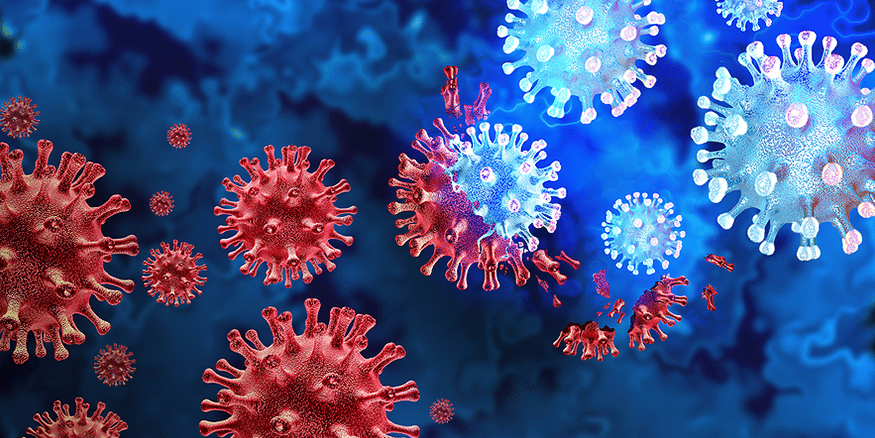
COVID-19 Variants
Genetic variations of viruses, such as the one that causes COVID-19, are common and expected. Viruses mutate as they reproduce in the body. These changes to the genetic material of the virus can create newer versions of viruses that differ substantially from the original, known as variants. Scientists use methods such as genetic sequencing to identify variants.
The greater the spread of the virus in the community, the greater the chances are of detecting novel successful mutations. Ideally, we should diminish the spread sufficiently so that fewer mutations can occur, but this requires a concerted effort by the entire world’s population.
When several significant mutations to the virus occur, it is identified as a variant and given a specific new name. A variant is of concern when it affects:
- disease spread
- disease severity (whether symptoms are mild or require hospitalization)
- the accuracy of current virus detection tests
- the effectiveness of protection from previous infection, vaccines, or treatments
The Public Health Agency of Canada works with the provinces and territories, and international partners, in ongoing monitoring for genetic changes to the virus and their potential implications. Although this is a rapidly changing situation, the current variants/subvariants of concern in Canada include:
- Alpha (B.1.1.7)
- Beta (B.1.351)
- Gamma (P.1)
- Delta (B.1.617.2)
- Omicron (B.1.1.529)
Why do Variants Matter?
Variants of concern include mutations that can make the virus more infectious, which means that it becomes more contagious and spreads more easily. Changes may also affect the severity of the disease, where infection with the new variant is perhaps less or more severe. Current evidence shows that variants might have different responses to certain drug treatments and vaccines. However, studies are ongoing to confirm these findings.
So far, COVID-19 infection caused by the current variants in Canada can still be detected by using existing authorized tests.
Variants can also develop mutations or minor deviations from the original and are sometimes referred to as subvariants. For example, the Omicron variant developed multiple subvariants classified as BA.1, BA.2, BA.3, and so on. There are many subvariants that are not publicized and have been classified by the World Health Organization (WHO), but it is the subvariants of interest and subvariants of concern that you may hear about.1
In July 2022, many jurisdictions across Canada announced the official beginning of a seventh wave of COVID-19, driven by the Omicron BA.5 subvariant. Information about the impact of this subvariant is still being collected and analyzed, but it has different characteristics than the BA.1 subvariant, such as how it responds to various COVID-19 treatments.
Can I Catch COVID-19 Again?
Reinfection occurs when a person who is infected fully recovers and then becomes infected again with the same virus, or its variant or subvariant. Studies show that individuals who have had COVID-19 may have some protection against repeat infections from their body’s production of antibodies. However, there are reports describing reinfections with COVID-19 among people who have recovered from a prior infection. Since little information and controlled research is available in this area, we still do not fully understand the timeframe and other parameters of reinfection.
Ongoing studies of COVID-19 are helping us understand:2
- how often reinfections occur
- who is at higher risk of reinfection
- how soon reinfections take place after a previous infection
- the severity (how serious the infection is) and symptoms of reinfections compared with initial (the first) infections
- the risk of transmission to others after reinfection
Potential Differences in Variants
Evidence demonstrates that the Alpha and Delta variants are at least 50% easier to spread than the original version of the virus identified at the beginning of the pandemic. The Beta, Gamma, and Delta variants each have certain mutations that may have an impact on vaccine effectiveness. Early studies suggest that Omicron is likely more transmissible than other variants of concern to date and the vaccines available as of July 2022 are less effective against this variant. Studies are underway to determine how much is due to:3
- Omicron’s natural ability to spread
- a reduction in immune protection following vaccination or previous infection
The good news is that the Moderna (Spikevax® Bivalent) vaccine/booster, which has improved efficacy against Omicron, has been approved since mid-September 2022.
What are the Current Variants of Concern?
According to the World Health Organization (WHO), Omicron is now the main circulating variant of concern. Alpha, Beta, Gamma, and Delta are no longer as frequently detected as they used to be, and therefore are not deemed to be “circulating,” but are still of concern as they have a history of creating infections with very severe symptoms. They are listed by the Centers for Disease Control and Prevention under the category of Variant Being Monitored (VBM). If you test positive for COVID-19 now (September 2022), then it is most likely that you are infected with an Omicron variant.
Good News About Changes to Incubation Period
Incubation period is the interval it takes from when someone is infected to when they show signs and symptoms of an infection. During this time, a person is typically contagious without knowing and mixes in society normally.
A large analysis of multiple studies4 observed that the pooled incubation period of COVID-19 was 6.57 days. The incubation period for COVID-19 caused by the Alpha and Beta variants was approximately 5 days. The incubation periods of COVID-19 caused by the Delta and Omicron variants were significantly shorter than that of the other variants. While some outliers can occur, it’s good news that the incubation period is progressively shortening. The study authors suggest that further research might be able to identify further incubation differences by age, sex, and chronic illness.















